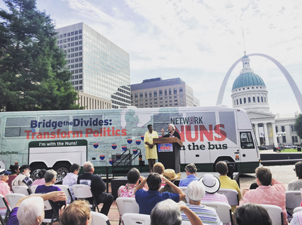
REJOICE! Federal Judge Orders Release of Names of SOA/ WHINSEC Graduates
Marge Clark
April 23, 2013
NETWORK continues to be supportive of the School of the America’s Watch (SOAW), in opposing our nation’s training of military leaders from Central and South America. Many NETWORK members are at Fort Benning with me each November, in prayerful protest to this violent, abusive use of our tax dollars.
Each year SOAW friends come to Washington and pressure members of Congress to close the School, to cut its funding, and at the very least again demand public release of graduates of the School. Once, in what seems a long time ago, we got the release of names and nations of graduates, and release of the texts used: books of torture techniques.
At the point that the name of the school was changed to the Western Hemisphere Institute for Security Cooperation (WHINSEC), the text cites were withdrawn and names and nations of students and graduates were kept secret.
But, now a great success! See below, from www.soaw.org:
[su_quote]Oakland, CA – In a rare reflection of judicial independence, United States District Judge Phyllis J. Hamilton from the Northern District of California ordered the Pentagon to release the names of who trains and teaches at the Western Hemisphere Institute for Security Cooperation (SOA/WHINSEC), a U.S. military training school for Latin American soldiers that has been connected to torturers, death squads and military dictators throughout the Americas. Human rights activists had taken the U.S. government to court over its refusal to release the information, and won.[/su_quote]
For more information, go to: http://www.soaw.org/news/news-alerts/4097-federal-judge-orders-release-of-names-of-soa-whinsec-graduates









